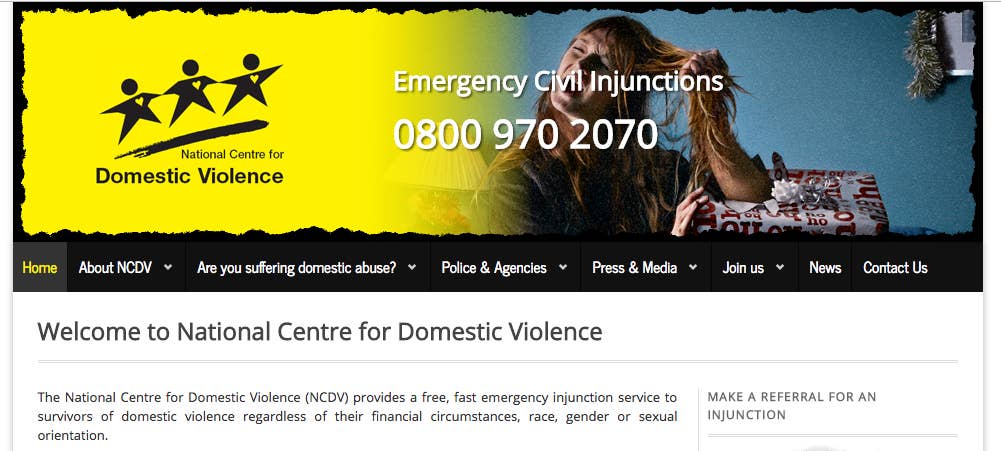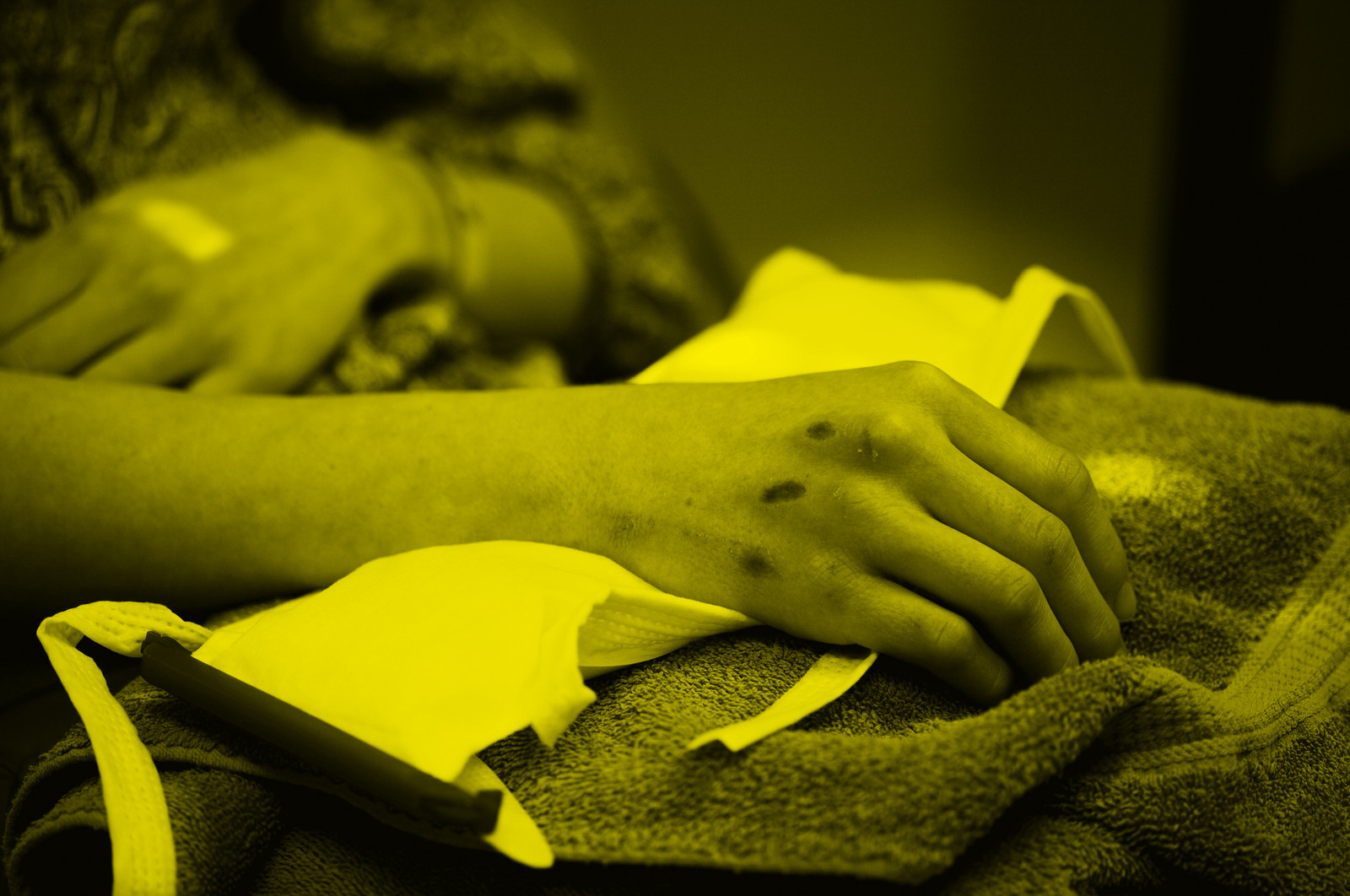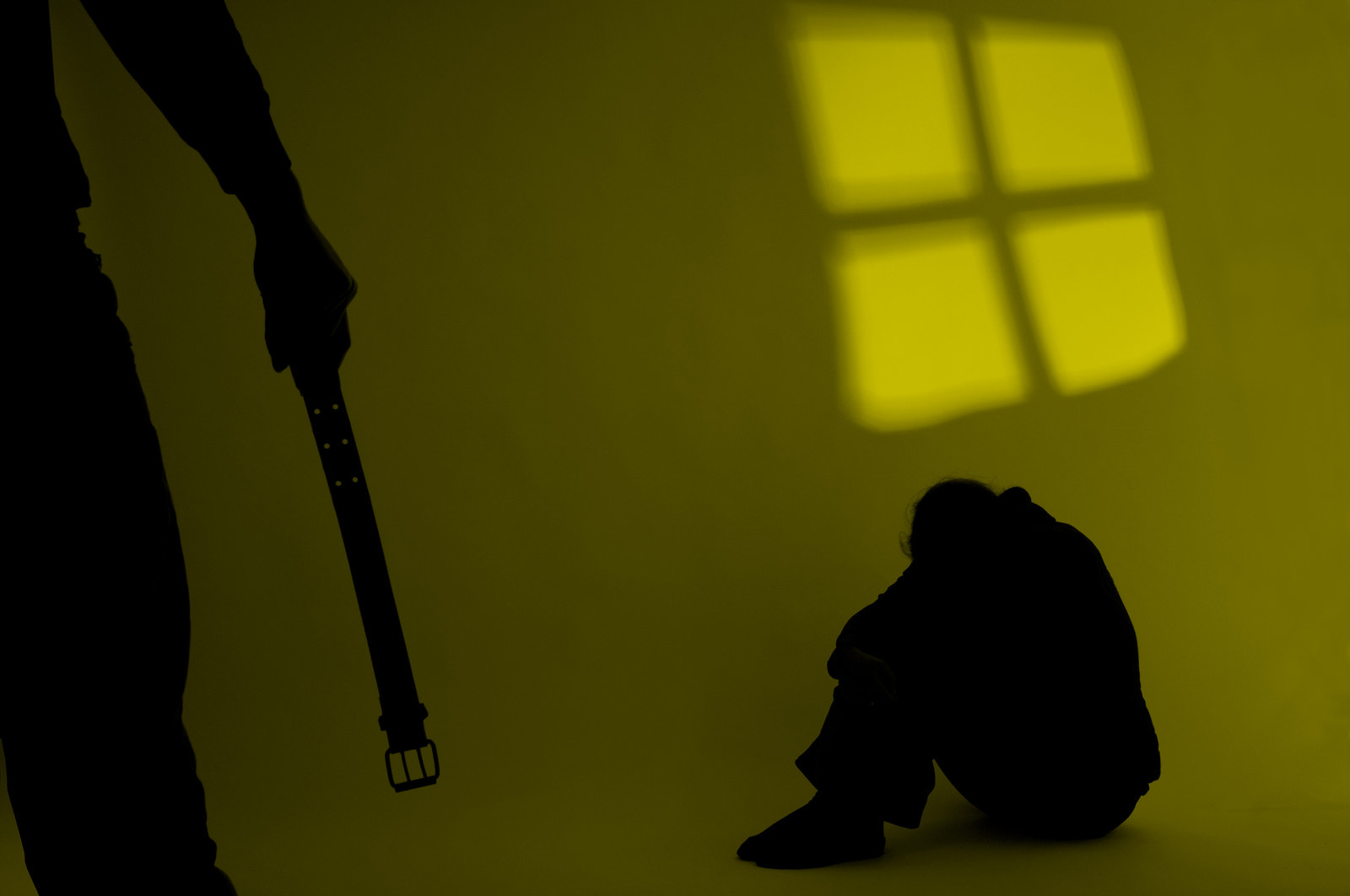A leading UK domestic violence organisation is facing accusations that it has failed victims, taken inappropriate payments from solicitors for referrals, and quietly moved from being a charity to a private company, according to information obtained by BuzzFeed News from whistleblowers, leaked documents, victim testimony, and public records.
The National Centre for Domestic Violence works with police forces and other agencies across the UK to help victims of domestic violence obtain emergency injunctions preventing their former partners from seeking contact with them. NCDV states it can generally help victims get an injunction within 24 hours, at no cost to themselves.
However, an investigation by BuzzFeed News has found:
- NCDV receives payments from legal aid solicitors for victims it refers to them – an arrangement found in at least one case to be in contravention of strict codes of conduct for lawyers.
- At least 19 other cases of law firms working with NCDV under similar arrangements have been referred to the Solicitors Regulation Authority.
- One domestic violence victim said she felt NCDV “dropped me like a hot potato” on finding out she was ineligible for legal aid and left her waiting days for even basic help, leaving her “completely disillusioned”.
- NCDV was established as a registered charity in 2006, but wound down as a charity in 2011 and reestablished itself as a private company – without making any public reference to this shift on its website or in its official accounts.
- Despite now operating as a private company, NCDV continued to list “patrons and supporters” on its website until recently; after being contacted by BuzzFeed News, it removed the word “patrons”. Several people originally listed in this section of the organisation’s site told BuzzFeed News they were unaware it had become a private company.
- NCDV does not disclose on its website to victims that it receives payments from law firms.
Presented with BuzzFeed News’ findings, Labour’s shadow minister for policing, Louise Haigh, called for an immediate government investigation into NCDV.
“People seeking emergency injunctions from organisations such as NCDV are at their most vulnerable and so it’s critical these operate completely openly,” she said.
“The suggestion that there may be undisclosed referral fees or other funding issues is one victims deserve to know and one which should be investigated to see whether it’s appropriate. If profit is a major motivator in how victims are treated, that would be completely shocking.
“The government should step in and immediately investigate these allegations, and police forces across the country now have a duty to conduct proper due diligence and establish whether it is appropriate to continue referring victims.”
BuzzFeed News made repeated approaches to NCDV for comment on the allegations against it, by email, phone, and a visit to the organisation’s office, but received no response beyond a confirmation that the company’s managing director had seen the letter.

What NCDV does
NCDV’s service to victims is essentially to act as a middleman between police forces (or victims searching online) and legal aid solicitors, who then go on to help obtain an emergency injunction in court. NCDV repeatedly promises to help victims obtain injunctions barring their ex-partners from contacting them within 24 hours.
Police officers in forces across the country either give the contact details for NCDV to domestic violence victims, or in some cases directly pass the victims’ contact details – with their permission – to NCDV.
The organisation then contacts the victim and finds out whether or not they are eligible for legal aid support – i.e. receiving public money to obtain the injunction – and if they are, passes them on to a local solicitor.
This is a fairly common model in the sector, and several other charities operate a similar service that they fund through donations or grants – but NCDV funds itself differently, instead taking money from the legal firms it sends clients to.
NCDV’s role as a middleman for people seeking emergency injunctions has been praised by multiple police forces and others, and the organisation lists testimonials on its website and elsewhere of those happy with its services.
But things don’t always go smoothly, especially for those who aren’t eligible for legal aid. One domestic violence victim, Jill – for legal reasons, BuzzFeed News is not publishing her surname – told of what she said was a series of failings from NCDV that left her even more disturbed and isolated.

“[It] seems to me they make all these boasts about what they can do, but they certainly did not deliver in my situation,” she said.
Jill said she had been attacked in 2015, and a defendant was charged with assault, sexual assault, and attempted rape but was later found not guilty.
“My Police Sexual Offences Investigation Team case officer visited me that afternoon to tell me the verdict and to explain that bail conditions had ended,” she said. “She commiserated about the result but explained that even if these cases get to court, they only count on 50% success rate.”
Jill’s police case officer allowed her to keep her police-issued GPS rape alarm following the verdict, and put her in contact with NCDV to obtain an injunction.
Jill said she attempted to contact NCDV by phone and through online forms, but struggled to get any response. When she then chased for one, she was told NCDV was waiting on information from the police, but said the police said they had already supplied those details.
Eventually, Jill said, she received a form letter for her to fill in asking for a “McKenzie Friend” to go to court with her on the basis she would apply for a non-molestation injunction herself – she said this came 11 days after her first contact with NCDV, which promises its service allows anyone to apply for injunctions within 24 hours – with no other support.
“I was completely disillusioned with NCDV. So much for their boast that they can obtain an injunction in less than 24 hours,” she said.
“All this is in the context of being afraid for my safety and my distressed state – I just wanted to recover from the ordeal – plus not being familiar with injunctions. And the thought of going back into a court again made me so apprehensive. So NCDV's failure to live up to their promises exacerbated my situation … This is a man who threatened to kill me and I am still concerned that he may try to inflict revenge upon me.”
NCDV and referral fees
Jill told BuzzFeed News she felt NCDV had “dropped [her] like a hot potato” on learning she was not entitled to legal aid, which the organisation appears to use as a source of funding – but one that faces serious concerns from regulators, as it may breach solicitors’ codes of conduct.
Internal NCDV documents seen by BuzzFeed News reveal NCDV enters into “payment recovery agreements” with law firms under which it receives payments of £178.50 plus VAT for “non-legal assistance” to clients. If this is covering costs such as collecting statements or other necessary work for preparing a case, it is allowed under the strict rules covering how public money is used.
If, however, the payment is suspected to be a quid pro quo for passing work to the solicitors’ firm, it is prohibited by the solicitors’ code of conduct, which is governed by the Solicitors Regulation Authority.
In a ruling earlier this year settled by agreement, the SRA found that a deal between NCDV and Duncan Lewis Solicitors violated the code of conduct.
“The firm entered into an arrangement with the National Centre for Domestic Violence ('NCDV') for the referral of clients seeking urgent legal assistance,” the ruling states. “The NCDV carried out preparatory work on the cases, such as obtaining the client's witness statement, before referring the client to the firm. The firm paid NCDV £170 plus VAT for each referral. The cases referred by NCDV all benefitted from public funding. …
“The firm did not tell the clients referred to them by NCDV that the firm had paid a fee for that referral.”
The ruling found that such practices broke two terms of the solicitors’ code of conduct, and “rebuked” the firm, fining it £2,000 plus costs of £1,350.
BuzzFeed News has seen an acknowledgement from the SRA confirming it was examining at least 19 more cases involving solicitors’ firms working with NCDV.
A spokesman for the SRA said it does not comment on any cases until a public ruling is available.
Documentation seen by BuzzFeed News suggested NCDV handled more than 7,000 cases in 2016, suggesting it could have received up to £1.25 million in fees from solicitors’ firms doing work with public money in that year alone. The company has said it had a caseload of around 10,000 a year in the past, leaving its potential income from publicly funded solicitors in excess of £5 million.
From charity to company
NCDV was established in 2006 as a registered charity and operated as one for five years, receiving national newspaper and television coverage and praise for its work from celebrities and serving police officers, some of whom it continued to list as “patrons and supporters” of its work until recently, when it removed the word "patrons" after being contacted by BuzzFeed News.
Its website operates under an org.uk web domain, traditionally used by not-for-profits, and some quotes and information on the site continue to refer to it as a charity.
However, documents obtained by BuzzFeed News through Companies House and the Freedom of Information Act show NCDV wound down its charity in 2011 and reincorporated as a limited company in 2012, operating under the same name.
NCDV’s final charity accounts, which were filed 18 months late and long after it had become a private company, made no mention of the charity winding down, but registered just £500 of income against £237,060 of spending. In the previous year the charity had run a surplus of more than £130,000. The document’s “plans for the future” section made no reference to it ceasing operation as a charity, despite being filed two years after it had ceased to operate.
The official articles of association of the new private company NCDV include no measures stating it is a social enterprise or that shareholders cannot receive a dividend or other form of profit. The company was initially owned by NCDV’s founder Steven Connor, but was transferred last year to its current director, Mark Groves.
NCDV’s website makes no mention of its transition from a charity to a private company, giving only its trading name and “registered number”, risking the impression to a casual visitor that the organisation is a charity.
BuzzFeed News asked a number of people who were listed as “patrons and supporters” whether they were aware NCDV had become a private company, and while some said they were aware of the change, several were not – and some were unaware they were listed on the website at all.
A spokeswoman for former Crimewatch presenter Nick Ross, who is listed on the site, said: “He recalls supplying NCDV with a quote some years ago but has no role with them and is not a patron. So far as he could establish they were legitimate and used for referrals by police and other agencies."

She continued: “Whether or not they are a registered charity doesn’t concern him greatly, provided the work they do is valuable and done with integrity.”
Siobhan Sinnerton, a documentary filmmaker who is now a commissioning editor at Channel 4 told BuzzFeed News she would be asking to be removed from the site.
“NCDV, who at the time were a charity, took part in a documentary I made on domestic violence a decade ago, before I worked for Channel 4. Afterwards they asked me for a quote about my experience of working with their staff, who at the time I found to be committed and caring.
“I have had no involvement with them since so am surprised to learn that I am still listed on their website in their ‘supporters and patrons’ section. I am now told that they appear to no longer be a charity. I am grateful this has been brought to my attention and I will be contacting NCDV to remove me from their website.”
Brian Moore, a former chief constable of Wiltshire police, said: “It is many years since I ceased to be a 'patron'. I am unaware of the organisation's status and so cannot comment.”
Sir Mark Potter, the former head of the family law division of the judiciary, said he “did not recall” being a patron of NCDV, and had no record of having ever been so, but said this may also be that he “simply does not remember” and had kept only patchy records of organisations he had agreed to serve as patron.
BuzzFeed News asked NCDV a detailed series of questions on whether its owners had taken money from the company, whether Groves paid Connor for his shareholding when he took it over, why NCDV had made no mention of its change in structure, and why people were listed as “patrons” of a private company without their knowledge.
NCDV did not respond to BuzzFeed News’ queries.
Concerns over serving injunctions
BuzzFeed News has also heard concerns about how NCDV serves injunctions to perpetrators once they are issued.
Jill said she was told by NCDV that as she was ineligible for legal aid, she would have to pay £100 to have an injunction served, if one was granted, and only one attempt would be made to do so.
NCDV previously used an independent company, i-Docserve, to serve injunctions to perpetrators – a critical process that must be completed according to strict rules if the injunction is to be valid.
i-Docserve’s directors served alongside NCDV director Groves on the boards of other companies, and emails seen by BuzzFeed News suggest staff worked between the two organisations on occasion. However, i-Docserve went into administration last year, owing HMRC more than £98,000, according to Companies House records.
Since then, NCDV has handled serving injunctions itself, charging solicitors’ firms or victims up to £130 plus VAT for the service, which it states it conducts on a “cost-neutral” basis. However, it then cut the fee paid to the people who actually serve the orders from £80 to £60, leading one former volunteer at NCDV – who asked to remain anonymous – to worry that the reduced fee would lead to less effort being made to serve the orders, potentially leaving victims at risk.
BuzzFeed News asked NCDV about its relationship with i-Docserve, its fees paid to process servers, and its service to victims ineligible for legal aid, but received no response.
NCDV’s relationship with police
Multiple police forces across the country continue to refer victims to NCDV, usually alongside other domestic violence services offered by charities.
BuzzFeed News contacted several large police forces to ask if they were aware of NCDV’s status as a private company, or of the SRA’s public ruling against a solicitors’ firm working with the organisation, and whether they continued to work with NCDV.
Detective Chief Inspector Myra Ball from Greater Manchester police said the force no longer referred people to NCDV, but did not give a reason for this.
She said: “We are aware of the services provided by the National Centre for Domestic Violence (NCDV) and in the past, our officers have referred victims to this service …
“However as an organisation our officers are trained to signpost victims to www.endthefear.co.uk and provide victims with contact cards which feature support services nationally and locally.”
A spokesperson for the Metropolitan Police Service said the force referred victims to a range of services, including NCDV, which it was aware did not operate as a charity.
“The MPS advise staff to consider a wide range of referrals to support services, many of which will have a local feel and may be specific to that particular London borough,” the statement said.
“The MPS are aware that the National Centre for Domestic Violence (NCDV) is no longer a charity but the service they provide to victims is free and they state victims will never be charged.
“In a similar way, boroughs may choose to refer to local solicitor firms who offer to work pro-bono for victims of domestic abuse. These are not registered charities but they too provide a fee service for victims of domestic abuse. Like the support services, there would be too many to include in any central guidance.”
The MPS initially said its officers did not provide the NCDV with any details of victims, but when presented with a post saying the force had approved officers to use NCDV’s iPhone app, altered its statement to say officers “should only be providing personal details to any of the various support services with the full consent of the victim”.
The force said it was unaware of the public SRA ruling against a firm working with NCDV, and could not “possibly be aware” of any London-based firms who may have breached the code of conduct.
BuzzFeed News made multiple attempts to contact NCDV by phone and email, provided them with the information in this article, and eventually visited the company’s offices, but was refused entry. “There isn’t anyone to speak to you,” said a member of staff who did not give her name. “I have forwarded your emails to our director.”
BuzzFeed News left a further letter for comment with the staff member, but received no comment from NCDV following the visit.
